- Home
- Technical Cooperation Projects
- Index of Countries
- Asia
- Mongolia
- Project for Promoting Employment of Persons with Disabilities (DPUB2)
- Project News
- [CASE 6] Oyu Tolgoi LLC, a Leader in the Mongolian Economy through the Exploitation of Underground Resources "Providing opportunities for each individual to make the most of their expertise based on their characteristics."
Project news
2023-03-24
From the workplace of employees with disabilities in Mongolia
Mongolia ratified the Convention on the Rights of Persons with Disabilities in 2009 and has strengthened measures to guarantee the rights of persons with disabilities and promote their social participation. To realise them, the government developed legal systems, including the Law on the Rights of Persons with Disabilities in Mongolia promulgated in 2016, which stipulates the rights of persons with disabilities. In 2017, the promotion of employment for persons with disabilities was set as a national goal. Aiming for more solid and continuous development, the Japanese technical cooperation "Project for Promoting Employment of Persons with Disabilities in Mongolia" has been implemented since 2021.
In this column, the project visits Mongolian companies promoting the employment of persons with disabilities, interviews the people concerned multilaterally and considers the realisation of employment that brings happiness to both persons with disabilities and the companies.
[CASE 6] Oyu Tolgoi LLC, a Leader in the Mongolian Economy through the Exploitation of Underground Resources
"Providing opportunities for each individual to make the most of their expertise based on their characteristics."
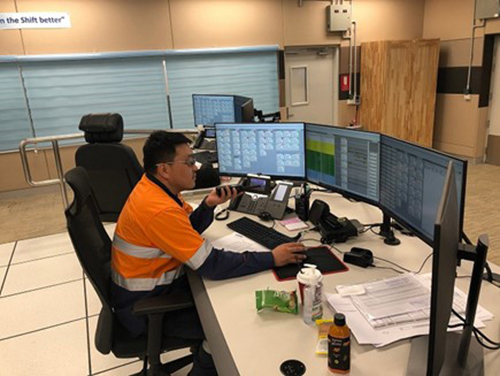 D. Tsogterdene, who is with visual impairment, gives instructions while monitoring the underground mining site on a monitor. His wife and three daughters live in Ulaanbaatar, while Tsogterdene works alone at the mining site in South Gobi for half the month and spends the other half with his family in Ulaanbaatar (courtesy of Tsogterdene)
D. Tsogterdene, who is with visual impairment, gives instructions while monitoring the underground mining site on a monitor. His wife and three daughters live in Ulaanbaatar, while Tsogterdene works alone at the mining site in South Gobi for half the month and spends the other half with his family in Ulaanbaatar (courtesy of Tsogterdene)
A new position created after the accident
The Oyu Tolgoi mine is located about 550 kilometres south of the capital city, Ulaanbaatar. Surrounded by the Gobi Desert, the fourth largest desert in the world, and 70 kilometres from the border with China, the mine contains the world's largest deposits of copper, gold, silver, molybdenum, and other vast mineral resources. In particular, the mine produces 450,000 to 500,000 tons of copper annually, literally leading the Mongolian economy.
Oyu Tolgoi LLC heads up the greatest mining exploitation project in Mongolia's history. The company was established as a joint venture between Rio Tinto, a multinational group of companies in the mining and natural resources sector, and the Mongolian government. It has 4,000 full-time employees as of August 2022. Including those who work for over 150 subsidiaries and affiliated companies, the staff of Oyu Tolgoi LLC consistently exceeds 19,000, boasting a dominant presence to drive the Mongolian economy and society.
The company actively promotes the employment of persons with disabilities. As of August 2022, there were 28 employees with disabilities, and the entire business employs nearly 150 persons with disabilities in various ways.
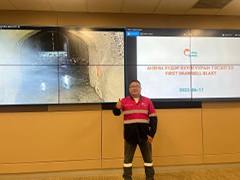 Tsogterdene attended a seminar at the Oyu Tolgoi mine in mid-June 2022 (courtesy of Tsogterdene)
Tsogterdene attended a seminar at the Oyu Tolgoi mine in mid-June 2022 (courtesy of Tsogterdene)
One of them, D. Tsogterdene, works at the mine office in South Gobi as a coordinator who watches over the workers in the underground tunnels from the surface via a monitor and gives them real-time instructions. He is now an employee of Oyu Tolgoi LLC but previously worked for Redpath Mongolia, its site contractor, for about nine years.
Tsogterdene was born and raised in Ulaanbaatar. Both his father and brother, archaeologists, took him to a local excavation site every summer, which led him to develop an interest in mining. Tsogterdene majored in mining engineering at university, and after graduation, he found a job at a mining company. However, the company collapsed after less than a year due to the economic recession, and he moved to Redpath in March 2010. With pride in being involved in the prestigious Oyu Tolgoi mine project, he worked hard at the 800-meter underground mining site and was soon promoted to senior employee, supervising other workers.
However, in February 2017, Tsogterdene was unfortunately involved in an accident and lost one of his eyesight. Redpath warmly supported him by donating the cost of emergency surgery in India and promptly arranging temporary leaves. However, he was devastated, despairing that his career in mining was over, and he remained depressed during his recuperation period.
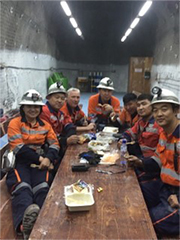 With friends who went underground together and worked hard at the mining operation. Tsogterdene is second from left. (Courtesy of Tsogterdene)
With friends who went underground together and worked hard at the mining operation. Tsogterdene is second from left. (Courtesy of Tsogterdene)
The day Tsogterdene returned to work, still in a depressed mood, he received an unexpected offer from the human resources department. They suggested he work as a coordinator who would instruct the underground mining site from the office above ground through a monitor. Mining work is challenging to systematize because it relies heavily on intuition and skills cultivated over many years. Redpath is well aware of this fact, so they offered him a new position with the same pay and benefits as before, allowing him to utilize his wealth of experience for future work. The passionate emotion that welled when receiving the offer, "There are things only you can do because you have worked so hard," is still vividly engrained in his mind. Tsogterdene then joined Oyu Tolgoi headquarters in May 2019. With full support from Redpath, he could work in the same position as a coordinator.
Tsogterdene has recently been working hard to promote the disability registration system. He was actually not ready to register for disability immediately after the accident, even though his former workplace warmly accepted him. He could not accept that his disability was quantified in the form of work loss, as he felt labelled as "so inferior" to regular workers. He overcame this conflict after meeting a one-eye blind friend since childhood for the first time in a long time. He received a disability certificate in the fall of 2020. At that time, an ex-colleague at Redpath told him that disability registration allowed him to receive a reduction in resident tax and increase the amount of annual leave he could take. He went to the human resources department the same day to ask about the benefits. He agreed that the system was indeed beneficial to both the employees and the company and finally received his disability certificate nearly three and a half years after the accident.
From his experience, Tsogterdene hopes to make as many people as possible aware of the benefits that working with persons with disabilities can bring to companies and the people concerned. He actively raises awareness within the company, including appearing in a PR video about the disability certificate produced by Oyu Tolgoi LLC. "I believe that many people still cannot openly talk about their disabilities and are trying to hide them. I can understand why they would not want to do that, so there must be something that I can tell them," he said forcefully with enthusiasm.
Messages conveyed to society by persons with disabilities in work
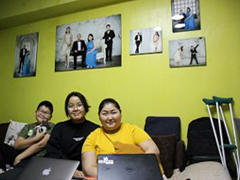 B. Enkhnyam (far right) relaxing at home in Ulaanbaatar with her daughter and son
B. Enkhnyam (far right) relaxing at home in Ulaanbaatar with her daughter and son
A person with disabilities also works at the company's headquarters in Ulaanbaatar. B. Enkhnyam has a disability in her lower limbs due to polio in childhood and has been working in the Business Administration Department. She started working in the summer of 2021 after working at another company and a district public office.
Born in Khovd Province in western Mongolia, Enkhnyam was raised by her grandparents with his older and younger sisters in place of his parents, who were married as students. She lived with her parents in Darkhanor Province from age 13, but her life changed when she studied abroad in India at 22. Although her mother vehemently opposed her decision to go to India because of her disability, Enkhnyam had heard about the Indian education system before, and her determination remained strong. Her father supported her when she applied for and processed the visa. He helped her until he silently saved money for the tuition and convinced her mother.
After six months of intensive English classes in Bangalore, a city in southern India renowned as an IT city, Enkhnyam studied human resource development, management and finance for two years, earning an MBA (Master of Business Administration). After graduation, while working in a bank in Bangalore, she married Sam, four years her junior, a local native, and they had their first daughter. These significant changes in her personal life were the second turning point. She decided to take a break from the career she had boldly ventured into India to pursue and accumulate and return to her homeland. She returned to Mongolia with her husband to start a new life. Two years later, their first son was born.
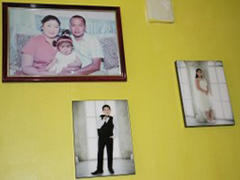 Many family photos displayed in Enghnyam's home
Many family photos displayed in Enghnyam's home
Her husband, Sam, joined Oyu Tolgoi LLC before her. He was an IT engineer, using his major from school, and had a routine of working in South Gobi for a month and spending two weeks with his family in Ulaanbaatar. After settling into a routine, Enkhnyam also found a job posting with the company and applied for it. She began working, using her English and business skills built up in India.
Enkhnyam's employment has brought about changes in the company. Instead of her using outside parking, the administration department contracted an underground parking lot at an adjacent luxury hotel to ensure a smooth and comfortable commute for Enkhnyam, who drives from her home to work and transfers to the office floor in her wheelchair. Her colleague Ts. Nomin recalls, "When I reviewed the office again after she joined us, I noticed many things for the first time, such as the water server being positioned too high to reach from the wheelchair. In addition, she became aware that even the roads she usually walks on casually have many steps and are not accessible.
Several years ago, Enkhnyam participated in the "Disability Equality Training" as part of the earlier DPUB2 project and learned about the ideal symbiotic society in which persons with and without disabilities respect each other's personality and individuality without being separated. She has since been working to spread this philosophy in Mongolia. Her actions, rooted in the belief that "if persons with disabilities do not work, it is impossible to convey a message to society," are steadily changing the consciousness of the people around her.
Human resources department taking the lead in raising awareness within the company
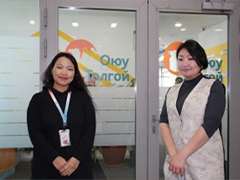 Ts. Tsolmon (left), in charge of employee training in the human resources department at the head office, and D. Odgerel (right), in charge of employee benefits-related support services
Ts. Tsolmon (left), in charge of employee training in the human resources department at the head office, and D. Odgerel (right), in charge of employee benefits-related support services
Besides Tsogterdene and Enkhnyam, Oyu Tolgoi LLC employs persons with hearing impairments who use hearing aids and persons with amputated fingers serving as drivers and guides for the coal-hauling trucks.
Ts. Tsolmon, who is in charge of employee training and development in the human resources department, and D. Odgerel, who is in chatge of employee benefits support, point out that "mining work involves going underground from several hundred meters, sometimes more than 1,300 m. The environment is different from that above ground, and there are many risks involved since heavy machinery is used." In addition, South Gobi is far from Ulaanbaatar, and workers are forced to work for a month in the mine. For this reason, especially when employing persons with disabilities, the employees' selection and assignment are decided through close communication across departments, including those in charge of health and sanitation and labour management.
However, it may not be a simple matter. Activities to promote understanding of disability within the company require careful consideration not to hurt those who "do not want the company members to know of their disability". The two confide, "It is a continuous process of trial and error, as some staff may not be recognized as disabled from their appearances, and some may not even think of themselves as disabled." Nevertheless, they both agree on the importance of raising awareness and provision of reasonable accommodation within the company to promote the employment of persons with disabilities.
As part of this effort, they plan to conduct training for employees and workplace assessments this fiscal year in cooperation with an NGO carrying out activities to understand disabilities. Moreover, the company is rapidly developing systems for employing persons with disabilities, such as exempting CVs submission if a company employee refers an applicant and formulating personnel selection criteria according to the type of disability while consulting with a lawyer.
Furthermore, as mentioned above, there is a valuable example of Tsogterdene, who changed his working style after the accident but has consistently utilized his expertise in the company. As he shares his experiences within the company, the number of persons with disabilities who have revealed their disabilities and issued certificates is gradually increasing.
We viewed the company's approach with considerable enthusiasm as a leading company in Mongolian, which considers what each individual can and cannot do and proposes ways of working that make the most of their expertise and characteristics. While the unique working environment in mining requires various considerations, such the company's efforts while paying attention to safety management are worth mentioning. If the job coaches trained by DPUB2 can identify and match each person with a job that matches their characteristics, the company's employment of persons with disabilities will surely expand even further.
Company profile
| Company name | Oyu Tolgoi LLC |
|---|---|
| Business | Mineral Resources Mining |
| Number of employees (entire group) | 19,000 (as of August 2022) |
| Number of employees (Oyu Tolgoi LLC) | 4,000 (as of August 2022) |
| Number of employees with disabilities (entire group) | 150 (as of August 2022) (visual impairment, physical impairment, speech impairment, etc.) |
| Number of employees with disabilities (Oyu Tolgoi) | 8 at headquarters, 20 at mines (as of August 2022) |
| Reasons for employment of persons with disabilities | Social responsibility as a leading company in Mongolia |
| Initiatives for employing persons with disabilities |
|
What is the "Job Coach Employment Support Service"?
The job coach employment support service is a specialised employment support service for persons with disabilities and companies through job coaches, which will be provided from June 2022 by the General Authority for the Development of Persons with Disabilities of Mongolia.
Through this service, hundreds of persons with disabilities are expected to be employed by companies annually. Meanwhile, companies that struggle to employ persons with disabilities must fulfil their social responsibility by paying the levy.
- About JICA
- News & Features
- Countries & Regions
- Our Work
- Thematic Issues
- Types of Assistance
- Partnerships with Other Development Partners
- Climate Change / Environmental and Social Considerations
- Evaluations
- Compliance and Anti-corruption
- Science and Technology Cooperation on Global Issues
- Research
- JICA Development Studies Program / JICA Chair
- Support for the Acceptance of Foreign HRs / Multicultural and Inclusive Community
- Publications
- Investor Relations
